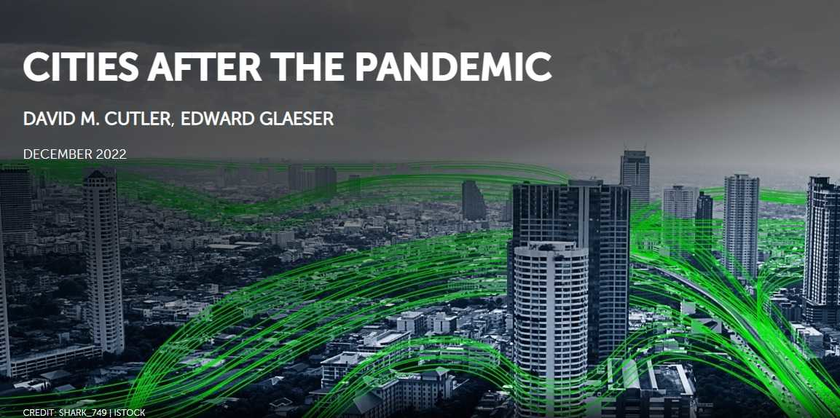The lure of urban life remains strong, but some cities could benefit at the expense of others
What impact will the double blow of the COVID-19 pandemic and the remote-working revolution have on cities, the heart of the world’s economy? Humans are a social species, and live interactions are particularly valuable for transmitting complex and nuanced information as well as for enjoying life. As long as we don’t face a new and deadlier pandemic in the near future, the cities of the developed world will largely recover; their appeal to knowledge-intensive industries and younger workers is that strong. The cities of the developing world have already come back, but they may suffer future costs if reduced global business travel leads to a decline in foreign direct investment.
As we have seen, pandemics can be enormously costly—both in lives lost and economic disruption. The central lesson of COVID-19 is that the wealthy world should invest more in public health and medical care systems to prevent future pandemics. This must also mean more investment in the poorer parts of the planet.
Cities connect people, and urban proximity brings many economic and social benefits. Urban connections have enabled collaborative creativity ever since Socrates and Plato bickered on an Athenian street corner. People earn more in cities than in rural areas, and cities have long been places where the dispossessed and displaced seek and often find economic opportunity. Cities also abet the pleasures of proximity, including the ability to share a meal at an urban café or share the cost of a museum or arts venue. Suicide rates are lower in cities than in rural areas, perhaps reflecting better mental health.
The pandemic has led to a feeling of geographic freedom not experienced for some time.
From Athens to New York
But there are downsides to density; contagious disease is the most terrible of these. Humans have millennia of experience with urban epidemics. The first well-documented urban plague struck Athens in 430 BCE. It helped Sparta defeat Athens in the Peloponnesian War and brought an end to Athens’ golden age. As Matthew Kahn (2005) has documented, natural disasters do far more damage when they strike weaker societies; the same is true of epidemics. The Plague of Justinian, which hit Constantinople in 541 CE, may have done even more harm. It helped plunge Europe into centuries of darkness, widespread poverty, and political chaos. The effects were so bad because it struck a continent that was already teetering on the brink.
Epidemics, terrible as they are, can have favorable aftereffects for those who survive. The Black Death killed perhaps one-third of Europe’s population in the 14th century. But the survivors were richer, because labor shortages led to higher wages. The resulting increase in per capita wealth helped spur the urban renaissance of the 15th century.
The beginnings of globalization in the 19th century hastened the spread of diseases like yellow fever and cholera. Each killed a vastly higher share of the population than COVID-19. Yet despite the deaths, cities continued to attract migrants by the millions. Rural life was difficult and not rewarding economically. The very poor will do most anything to escape poverty, which explains why COVID-19 will likely do little to deter urbanization in poor countries. Nineteenth century cities also continued to grow because they invested in clean water and sanitation. The great public health investments, such as New York’s Croton Aqueduct, marked a hinge of history, when governments started to save lives rather than merely killing their enemies.
Those investments helped usher in the fortunate century that lasted from 1919 to 2019, at least in the rich world. HIV devastated much of sub-Saharan Africa, but it had much less impact elsewhere, especially after the development of antiretroviral medications. Sexually transmitted infections inherently cause less concern than airborne infections. Sex can be avoided but breathing cannot. Further, potential outbreaks such as SARS, MERS, Ebola, and swine flu were contained without severe damage. That history helps explain why the rich world treated the risk of global pandemic so cavalierly before 2020. Unfortunately, we are far from confident that the human and economic harm wrought by COVID-19 will persuade policymakers to invest more seriously in plague prevention.
The wealthy world’s experience of COVID-19 was shaped by the technologies that allowed many of us to socially isolate and still earn a paycheck. In May 2020, when remote work was at its height, two-thirds of Americans with advanced degrees were working from home. Google mobility data show that visits to workplaces in the United States were still down by 28 percent in August 2022 compared with the pre-pandemic period. In Manhattan and London, workplace visits were down by more than 45 percent.
This shift to remote and hybrid work raises the specter of permanently empty offices and a downward cycle for cities: fewer workers reduce demand for local services, which leads to unemployment and less spending on public services, which causes more workers to flee. To be sure, individual cities are at risk, especially if they allow crime to shred urban quality of life. The pandemic has led to a feeling of geographic freedom not experienced for some time.
The world seems to be engaging in a deadly science experiment in which it is waiting to see what new plague will emerge.












 All while Pfizer—a company with a $2.3 billion criminal fine for fraudulent marketing, bribery, and kickbacks—was given blanket immunity from liability and billions in taxpayer dollars to produce a vaccine in record time with no long-term safety data.
All while Pfizer—a company with a $2.3 billion criminal fine for fraudulent marketing, bribery, and kickbacks—was given blanket immunity from liability and billions in taxpayer dollars to produce a vaccine in record time with no long-term safety data.
























